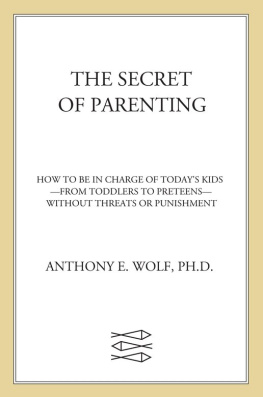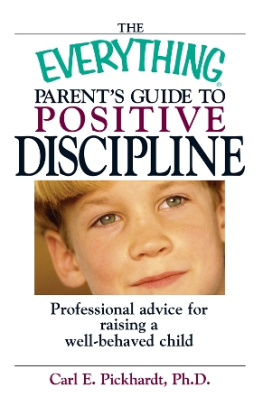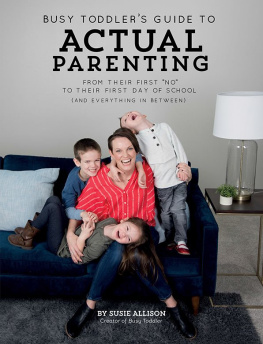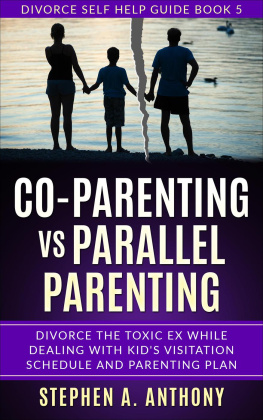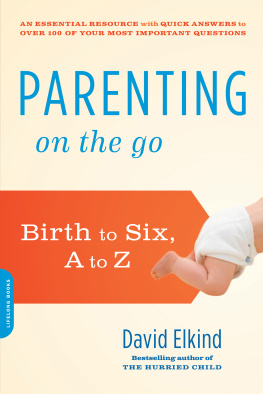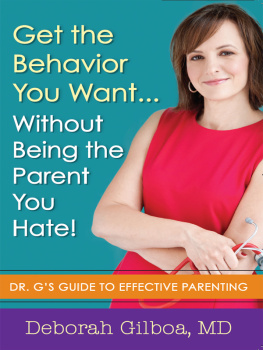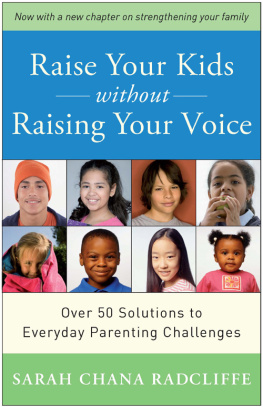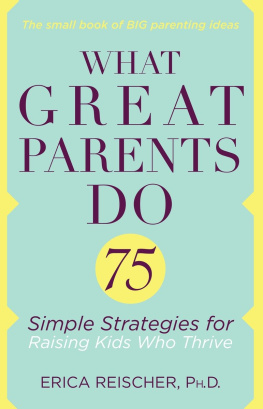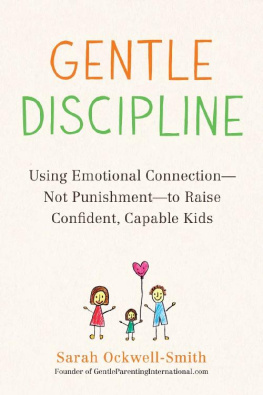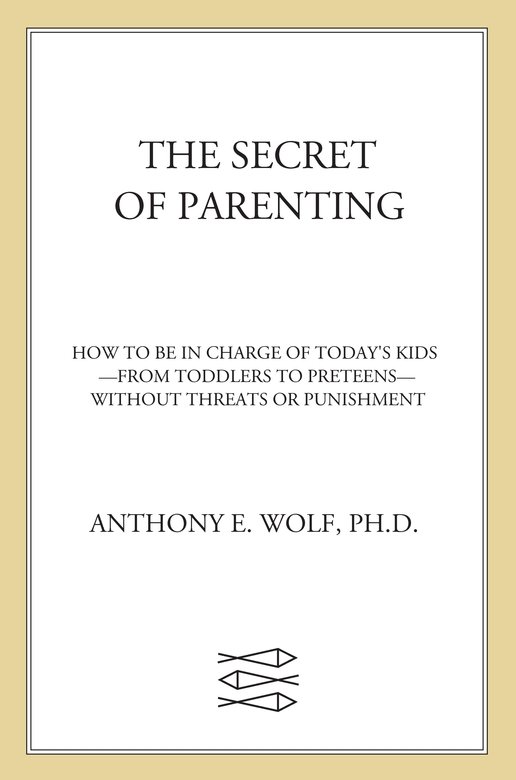This book was edited by Patty Bryan. Her skill and intelligence are reflected throughout the pages that follow.
I would like to thank Mike Bryan for his editing work, Elisabeth Kallick Dyssegaard for her help with this book as well as her unwavering and much appreciated support over the last ten years, and Joe Spieler, who by seeing some promise in what I wrote is responsible for my having a career as a writer.
I would also like to thank my two regular readers, my wife, Mary Alice, and my friend Hugh Conlon, both of whom have been extraordinarily generous in listening to, looking at, and commenting upon the book as it evolved.
I would also like to thank Tim Scussell for his kindness in making me welcome at his two McDonalds restaurantswhere most of this book was written.
Last, I want to thank Wendy Friedman and Diane Nadeau for their help in typing the many drafts of this manuscript.
Get out of my life, but first could you drive me and Cheryl to the mall?
A Parents Guide to the New Teenager
Its not fair, Jeremy Spencers parents let him stay up all night!
A Guide to the Tougher Parts of Parenting
Why did you have to get a divorce? And when can I get a hamster?
A Guide to Parenting Through Divorce
Our children are more seed than clay. They are themselves, their own little genetic package growing into whom they will become. As parents we can add our piece, put in the ingredients of parenting love, attention, encouragement, setting limits, making demands but we will not be able to shape them exactly as we wish. It simply does not work that way. What we as parents do is important, hugely important, but it is also limited. Beyond the sum total of our input good or bad remain forces that shape who they become and over which we have no control at all. Children take their own form. We can only put in what we feel are the best ingredients, and then hope.
In truth there is a special problem in parenting ones own kids. We care so much. We would be much more dispassionate, much better in control of ourselves were we raising other peoples kids. Because we love them so much, because we are so close to them, they easily pull out our baby self. But they also pull out from us what is probably the best that wehave to givewhat is truly selfless, caring not for ourselves, not for our pride, not for what we get out of it, but for them. But this does make us so vulnerable moment by moment when things dont seem to be going well, not the way we planned, not on the path that seems to lead to their best possible future success and happiness. With our kids we care so much.
But that same vulnerability translates into something on which our kids thrive. They know. For better or for worse, to us they are very special.
What do I want for my children? That they have a childhood. That so long as nobody gets hurt, there will be a place that is theirs, in which they are always okay. I may stop them. I may tell them how obnoxious they are being. At times I may even deposit them somewhere else. But I do no more. And if in my heart, even when I do not like what they are doing and clearly let them know, I also truly and deeply believe that whatever it is that they are doing is okay they will hear this, too. They will hear that with me there is this place, their childhood that I do want them to havea place where they are never bad, a place that is always safe and worry-free. A place of absolute nurturing.
And children who have been given this place do not grow up to be wild or disrespectful or to take advantage of others. Just the opposite. They become people who can give, care about others, and make the world in which they live a better place for their being in it.
And if a parent truly believes that giving a child this placea childhood is what is best, it turns out that that belief is a great aid in child raising. That it can make child raising so much easier and so much more pleasant.
For if parents truly believe that all the obnoxious, bratty, selfish behavior that they get is really not a big deal, that it is baby-self behavior and nothing more, and if they want tomake a place for the baby self, then parents will feel much less of a need to respond to all of the nonsense that the baby self throws at them when it is not getting its way. In turn, much of the baby selfs most obnoxious behavior is eliminated. In other words, if I can allow them a childhood, they will give me the joy of being a parent.
Baby-Self Basics
Seven-year-old Steven comes home from school. He opens the door, takes off his coat, and, not a foot away from a coat hook that conveniently sits on the wall directly next to the door, drops his coat on the floor.
Steven, how many times do I have to tell you to hang up your coat? says his mother exasperatedly as she enters the room to greet him.
I dont know. A lot? mumbles Steven as he then, with great effort, hangs up his coat.
The next day when Steven comes home from school, he enters the house and immediately takes off his coat. On this particular day, his mother, who only the day before had yelled at him for not hanging up his coat, happens to be standing right by the door.
Hi, Mom, says a happy Steven as he simultaneously drops his coat on the floor.
How many times will Stevens mother have to tell him to hang up his coat before he learns? Many. Since hes now in second grade, a rough calculation of years left in school times the number of days a year he will come home and drop his coat on the floor comes to ten times about two hundred, which is many, many times.
However, the rest of this story has an odd twist. Steven has a cubby at school and in that cubby is a coat hook. Every day, without anybody saying anything to him, Steven neatly hangs his coat on the coat hook in his cubby. Not all second graders regularly hang up their coats in school, but many who never hang up their coats at home do it at school without a second thought.
I use this story because its a simple example of a phenomenon that is true of all children, all adults, everybody. Each of us has two separate and distinct modes of operatingin essence two separate selves.
One of them is mostly an at-home self and I call it the baby self This self and how it acts is defined by two overlapping and overwhelming characteristics: the baby self must be fed and fed now , and it has zero tolerance for any form of stress. The baby self feeds itself by indulging, collapsing, relaxing, unwindingsoaking up all the good stuff. A perfect meal for the baby self would consist of lounging on the couch, eating Doritos, with headphones blocking out any unwanted interruption. The baby self gets stressed when it has to do something that it doesnt feel like doing at any given moment. Being asked to take out the trash while its lounging on the couch would qualify as major stress. This zero tolerance is often the part of the baby self that parents understand the least, and its also the part that causes the most trouble. Baby selves can be nice and lovable, but when theyre asked to tolerate any form of stress, they can get very cranky and crabby.
The other mode, which I call the mature self , exists mainly in the world outside the home. Unlike its baby-self counterpart, the mature self is willing to work, will tolerate stress, has patience, has self-control, and can and is willing to delay gratification. It will work toward a goal. Stevens mature self hangs up his coat at school.

